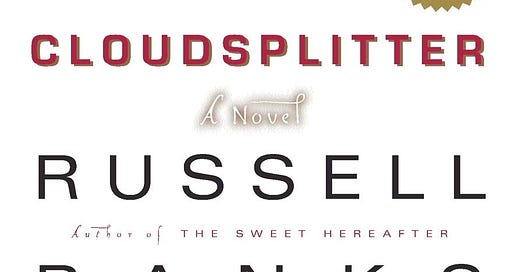You can get all these delivered right to your inbox. Comment, share and sign up today!
I apologize for the big delay. I’ve been very busy and it’s been harder and harder to concentrate write anything lately. As this pandemic drones on, we have to find ways to escape. Thanks for your patience. If you’d like to read my last book recommendation post, you can access it here
1.) Cloudsplitter by Russell Banks (1998)

I found this to be a unique novel by Russell Banks. He often writes stories of laborers who have endured great suffering. He reminds me of a John Steinbeck in a kind of way. This novel though is his best. It tells the story of John Brown and his family, from the viewpoint of Owen Brown, his third and only surviving son at the time. John Brown of course, as many know, is the famous abolitionist who in 1859 led a raid on Harper’s Ferry, Virginia in the hopes that he would set off a massive slave rebellion. This novel touches on Brown’s puritan lifestyle and how he raised Owen and his brothers. It offers a behind the scenes look at why Brown became an abolitionist in the first place and counters the well-known American historical viewpoint of him being just an insane political terrorist. It’s a faced-paced and easy read in my opinion. I would recommend this to anyone interested in the Civil War era and how abolition spread as a movement for the 30 years leading up the war.
2.) On the Grand Trunk Road by Steve Coll (1994)

This book by longtime journalist, Steve Coll, explores his experiences traversing the infamous Grand Trunk Road and how still to this day, it operates as a major trade artery for Indians and many throughout South Asia. Coll focuses on the caste system and the rampant poverty that businessmen and bandits exploit along the Grand Trunk Road. Through a first person perspective, the reader can feel Coll’s experiences in India and delve deeper into the culture. He conducts a lot of in-person, man on the street type reporting. Coll has done other excellent works on Indian and Pakistani politics, in which he draws on vast historical references. This book is definitely a good primer for those who want to read his more in-depth work such as Ghost Wars or his earlier work, The Bin Ladens.
3.) The Black Jacobins by C.L.R. James (1938)

Anyone interested in third world liberation movements or historical texts on African culture, should read C.L.R. James. This book is his most well-known work and it covers the Haitian Revolution from the slaves' perspective on the ground. Toussaint L’Ouverture of course is the main protagonist of this revolution, but James doesn’t leave out the solidarity shown between other slave groups on the island and how the vastly unequal ratio of slaves to planters, helped lead to the world’s first successful mass slave rebellion and revolution. As the book progresses, James breaks down the class system and how the racial intermixing led to a vast, complex diaspora of slaves and planters. It isn’t the most comprehensive work on the Haitian Revolution but it does offer historical insight into the planning of the “Black Jacobins” and how their bravery didn’t just lead to a revolution on the island but a revolution in the French Empire, leading to the destruction of the monarchy. It’s a must read for any young socialist and those interested in liberation movements past and present.



